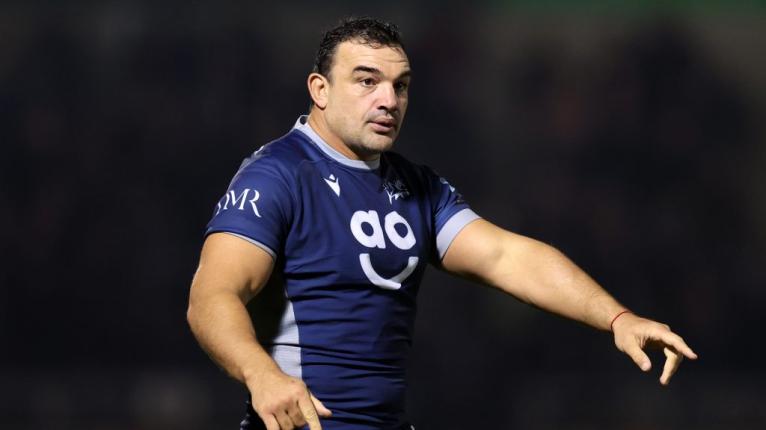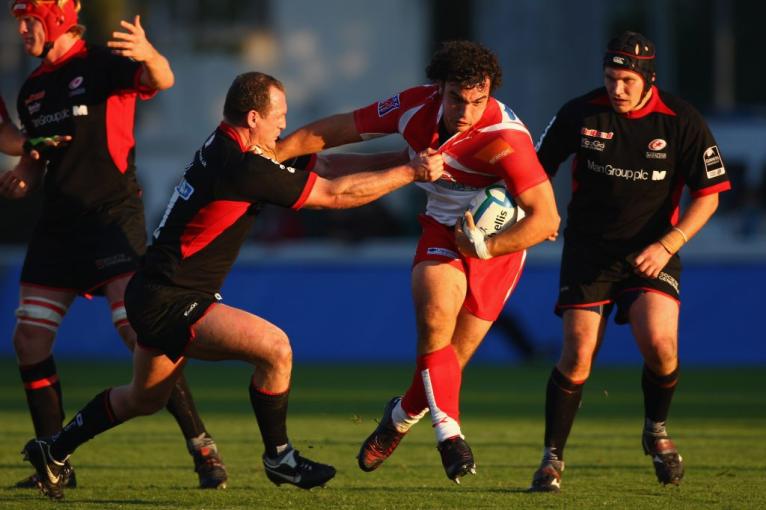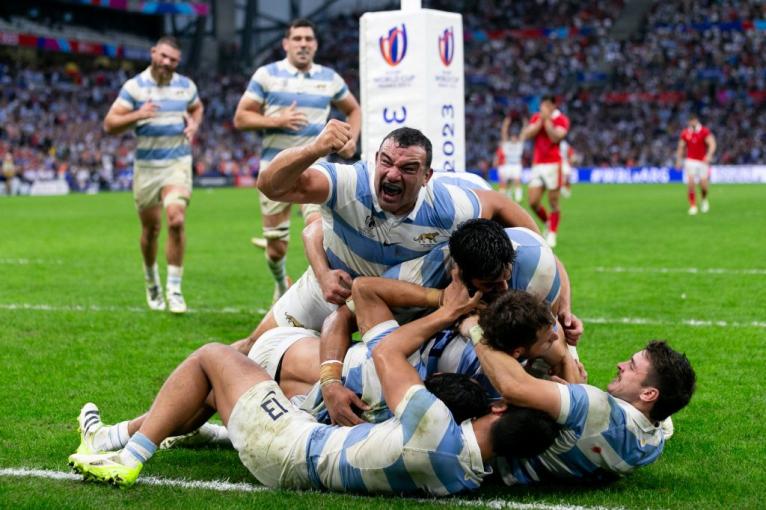Not a lot fazes Agustin Creevy these days. He’s tangled with the best for close to two decades and got the scars to prove it. He’s the most capped Argentinean of all time and a veteran of eight professional clubs. He’s played in the Top 14, Premiership and Super Rugby, competed at four World Cups, seen one team disbanded and another go out of business. No, little can knock the gnarled front-row warrior out of his stride.
And yet, as he sat on his couch in Buenos Aires this summer, Creevy felt jumpy. A flutter in the stomach. A twitch of the leg. He booted up his laptop, waited for the Sale Sharks hierarchy to loom onto the screen and remembered just how magical a hold this sport still has on him.
“It’s a funny thing – I’m 38 years old, waiting for the meeting with Alex Sanderson, and I’m still getting nervous,” he tells RugbyPass. “In that moment I realised if I’m still nervous, trying to impress, then I still enjoy playing. Imagine if I didn’t f***ing care if they contracted me, that’s it. But no, it was a challenge for me.
“It was a team who played in the Premiership final calling me at 38, it was special. Alex convinced me a lot. I didn’t come here for money, obviously. I came here to win things. I didn’t win the Top 14 or the Premiership. I want to win something and the team that is calling me was in the final last year.”

It’s this hunger that has kept him going all these years, through setbacks and criticism and injury, through a million scrums and lineouts and collisions with all the superpowers on the rugby landscape.
This was no pre-ordained journey. Creevy was never earmarked for greatness like some youngsters whose talent is obvious from the get-go. He only took up the sport at 13 when he moved to a rugby-playing school in his home city of La Plata. It’s fair to say rugby and Creevy were uncomfortable bedfellows at first.
Every week, coach Raul Frias would fetch up at his front door and every week, Creevy would hide.
“Marcela, we have a game today,” Frias would call to the boy’s mother. “I need to pick up Agustin.”
“No, please mum, I don’t want to go,” Creevy would beg.
“It was really important, that coach coming to my home,” he says now. “Maybe if no-one told me I needed to train, I would have quit or continued my life without rugby. I think he saw something or felt something.
“Playing rugby changed my life. I had a club, a new family, new friends. The club was like my second house.”
I don’t know how to say in English but my eyes started to go blind and I woke up in the changing room. It was really embarrassing.
Creevy was a nuggety flanker back then. He climbed the domestic ranks and won his first cap against Japan in 2005. Biarritz signed him aged 22 and he found himself pitched into a land of giants. Serge Betsen, Jacques Cronje and Imanol Harinordoquy were back-row comrades. Dimitri Yachvili was le petit general at scrum-half. Nicolas Brusque, Sireli Bobo and Ashwin Willemse galloped out wide.
“One day I sat in Serge Betsen’s spot in the changing room because I was alone and I didn’t know it was his,” Creevy remembers.
“The whole team started to look at me. He came in and said, ‘don’t worry about it, stay there’. He spent the whole season standing up next to me getting changed while I sat in his spot. I remember that. He was really kind and humble with me.”
Game time in that pack of heroes was hard to come by. Creevy actually signed a pre-contract with London Irish, some 11 years before he joined the club for real. His career was bumbling along nicely, if not threatening to scale great heights.
Then, Creevy was faced with a stark ultimatum, delivered by Pumas coach Santiago Phelan: convert to hooker or forget about your international prospects.
“Something inside me said, ‘no, I want to do this challenge’. It was not, you are going to come back and play Pumas. No. You need to come back and play for your club, San Luis, in the second division and try to be the best hooker, learn the lineout, learn the scrum.

“Someone needed to teach me but at that time we did not have a throwing coach or a scrum coach at our club. My throwing was terrifying. My mentality sometimes was really weak. Inside me, I became strong.”
There were harrowing moments that year. Creevy fainted in one scrum. He wept when he missed jumper after jumper in the lineouts.
“It was a derby in my city, we were doing a scrum and I was supporting the whole pressure. I don’t know how to say in English but my eyes started to go blind and I woke up in the changing room. It was really embarrassing.
“Wow, I remember my lineouts were not the best. When I threw badly, the guys laughed or made a joke. When we got back to the hotel, I’d go to the bathroom and start to cry. It was too much pressure. I tried to be better and better but things were not going well.
“That made me become what I am now. That was part of the journey. One year later, I was playing for the Pumas again. I am really proud of that.
“After that experience, every hooker I play with, I try to help. I can see in some players, they have the same problems. I try to teach them like no-one did for me.”
I could have said, maybe I can sign in the MLR, the ProD2 or Japan. But no, I want to finish strong.
A whistlestop tour of Creevy’s Pumas voyage takes in all manner of matches in most rugby nations. The statement World Cup wins over Scotland, Ireland and, this year, Wales. The bronze-medal showdown with England. Argentina’s first Rugby Championship win over Australia in 2014, with a heavily maligned Creevy their captain. Incredibly, less than four months from his 39th birthday, he may not be done on the international stage.
“Maybe I want to play one or two more games to say goodbye.
“After the semi-final when we lost to New Zealand, everyone asked me if I was angry. No, I am obviously sad but not angry because the difference was too much and they deserved to win.
“Straight away we turned the page and said we need to think of England, we want the bronze medal. We played better than the first game against them. I dunno, I’m happy we got to the semi-finals. I think everything is all right.”
This past year has been bereft of stability. Creevy loved the culture, verve and aspiration of Irish. His wife, Vir, and young daughter Elena were content in London. Vir works in law and recently sat exams to become a qualified solicitor. When the club went under, all of that was placed in jeopardy.
“I was on holiday and we had a lot of meetings with the RPA and lawyers and we were told the club is going to be suspended. I was not scared, I had the same thing with the Jaguares at 35, 36 years old during the pandemic and I thought, who is going to want me? I know how good I am but maybe other clubs don’t know that. It happened again here.
“London Irish was so good for me, so friendly, the team was ambitious and we played in a beautiful stadium in Brentford. My family was really happy. My daughter, Elena, was settled in school and my wife in her work. The first thing I thought in that moment was what am I going to do? I didn’t know if I was going to play the World Cup. Everything was unsure.”
Life is still a touch chaotic. “A mess sometimes”, as Creevy puts it. His family remain in Kingston-Upon-Thames while he rides the rails north for training and matches. He travels back on days off for precious time with his girls.
“I am really proud of my wife. She put my job over hers. She is really smart and working in London. After my career ends, we want to stay here, not forever, but for my wife’s work. She works, studies and is a mother without me because I am here training or playing.”
Creevy’s thirst to keep playing in spite of all this is remarkable. He’s been in the front-row for fourteen years and professional rugby nearly twenty and still he performs at the top level. His career has spanned such a vast period that he has played with 49-year-old icon Agustin Pichot and 21-year-old tyro Henry Arundell. When he won his first cap, Arundell was two. Creevy is a beacon of longevity in this attritional maelstrom.

There’s another factor at play; the glimmer of silver. The Top 14 eluded him at Biarritz, Clermont and Montpellier. His Jaguares side made a Super Rugby final but lost to the Crusaders. He couldn’t win the Premiership with Worcester or London Irish. How he longs to claim the trophy befitting such a wonderful tenure.
“It’s not the best way but I prefer to be playing in the top league. I could have said, maybe I can sign in the MLR, the ProD2 or Japan. But no, I want to finish strong, at the top. That was my mentality. No money, no nothing. It’s about pride.”
Sanderson was asked about Creevy in his press conference last week. The entertaining director of rugby gave a fulsome response. He spoke about Creevy’s iron work ethic, how he made his Sharks debut earlier than expected and with a grand total of 18 minutes training with his new colleagues. The pair sat down for coffee at Carrington and Creevy told Sanderson about the standards winning demands and how the handful of boys who turned up late to the gym were not upholding them. Often an ageing athlete’s mind frays before their body but neither Creevy’s desire nor his muscular physique are on the wane.
“I don’t know when I will finish,” he says. “I need to have the worst negotiation of my life – with my wife! That’s a joke. She has been with me my whole career.
“I’m still fresh, still training every day with the team, I don’t miss any sessions. And to be honest, I’m enjoying it. When they want to give me time off I say, ‘no, no, I prefer to train and stay with the team.’ Maybe one more year, when I will be 40, I think that is the limit.”
A limit? Don’t bet on it.



Agustin Creevy a rugby warrior, true, lives up to his name. I could have kept reading, I enjoyed it and wish the article was longer. They should write an article like this (but longer) for all players with over 100 International caps.
I literally crossed paths with Agustin on George St as he was shopping for his family in Sydney earlier this year. He was very pleasant and gracious. It's been such a pleasure to witness his career and the success he's had 👏
Sos un Grande Agustín, auténtica leyenda de nuestro rugby y fuente de inspiración para miles de chicos en los Clubs. No hay adversidad que te detenga, Crack!!!.
Great reading! We all love Agus; thank you, Capi, for all these years of rugby, your sacrifices, and always giving 100% no matter what. Sorry for the years “they” didn't let you play with the Pumas. Still, you came back and gave it all. You make Hugo and all of the Argies proud.
Awesome awesome dude!
True rugby hero
Nice one Jamie👍
Geez this the most awesomeness read I've had all year. There's something about Creevy I've always admired & respected. This nails the why. Thanks for sharing and woah ✅ Serge Betsen. Resilience personified. I thought I did ok playing ametuer club level to 35. ✊🏼